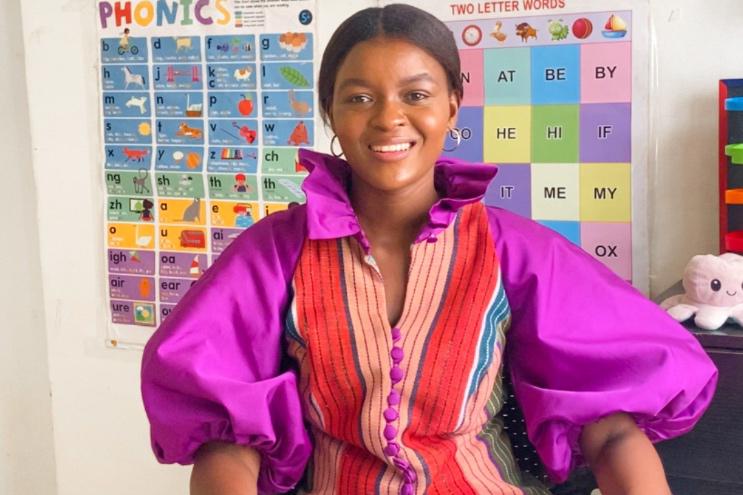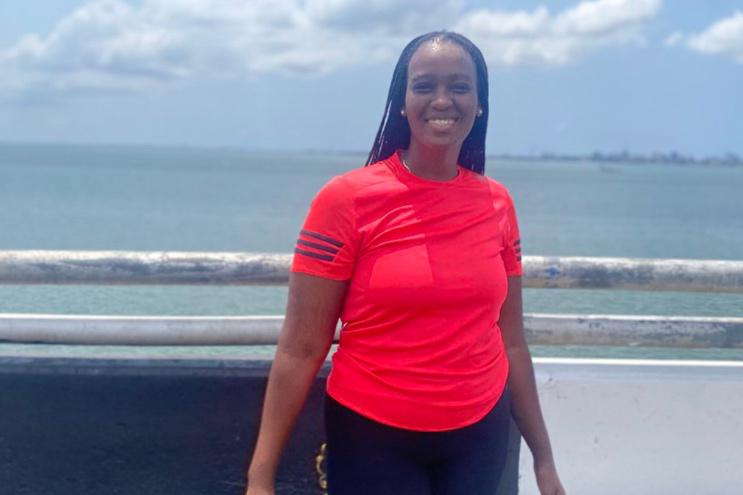In the early 2000s, Patience Ngamira developed a fondness for Lagos, Nigeria during her childhood in Zimbabwe. She was captivated by Nollywood movies, which she watched with her mother and aunties.
These Nigerian blockbusters, featuring actresses like Genevieve Nnaji and Patience Ozorkwor (who was her late mother’s favourite), piqued her curiosity about life in Nigeria, particularly in Lagos.
In those movies, Lagos is often depicted as the place where individuals would leave their villages to pursue success. It was portrayed as a city where dreams could come true, a bustling place for those aspiring for wealth and fame. As an adventurous girl residing in Harare, Lagos topped Ngarima’s list of African cities to visit someday.
Two decades later, the opportunity arose when she fell in love with a Nigerian man from Edo State while studying at a university in India. Instead of returning to either Zimbabwe or her second home in Zambia, she decided to follow her heart to be with her partner in Lagos, Nigeria.
Although the decision to depart from her cherished homeland was difficult, she was eager for the journey ahead.
After living in Lagos for five years, Ngamira, in this interview with The Record’s Omon Okhuevbie, discussed the cultural adjustments she faced, the challenges of being a foreigner in Lagos, and the similarities and differences between life in Harare, Zimbabwe, and Lagos.
This interview has been edited for clarity and brevity.
Can you share a bit about yourself and what you do?
My name is Patience Ngamira. I am a Zimbabwean living in Lagos and I have been living here for five years. I am a mom of one. My baby is 3 years old and he’s my everything. I hold an honours degree in hotel management, travel and tourism from a University in India. I am a stay-at-home mom and the reason why I choose to stay at home is to just raise my son and also work from home.
I’m also a homeschooling mom and the reason why I chose homeschooling for my baby is because I was homeschooled to a certain level and I saw the advantages that it brought into my life. I started posting homeschooling videos on TikTok and a few parents showed interest in it. That was how I started my business of being a private tutor.
I tutor kids from one year to primary two level. I’ve also gathered a few certificates on homeschooling, so that I can tutor these kids in the best capacity possible.
What motivated you to move from Zimbabwe to Lagos, Nigeria?
Love. Love motivated me and that’s why I’ve stayed for five years.
Was it a hard decision to make?
It was a big decision for me. When I moved here, I was going through some personal stuff. I had lost a close family member. So, moving here felt like I was also leaving his memories. But for the sake of growth and for love, I moved here. I left my family, my culture and came to a different territory – a brand new territory. I had to leave a lot of things back home. Yes, I’m here now and five years is not child’s play. That means I’ve been enjoying my stay here.
Can you share any culture shock you’ve experienced in Lagos?
The biggest culture shock I experienced here was seeing police officers carrying guns. Where I come from, our police officers don’t carry guns around. Coming here and seeing guns was a new experience. You turn left and right and you see policemen with guns. That really scared me.
Another culture shock is that people eat snails here. When I first tried it and felt that crunchiness, I was hooked on the first bite. I had to tell my auntie that I ate snail and she shouted. She was like how can you eat a snail?
Can you share your experience of adapting to the new environment and culture in Lagos?
The cuisine was my biggest challenge. This is because Lagosians and Nigerians eat a lot of pepper. Zimbabweans don’t eat pepper at all. So growing up not eating chilli and then coming to a country where most of the meals have chilli was really one of the biggest challenges I faced. But yeah, I think I did well and am adapting. I can now eat just a little bit of the spicy meals.
I had to also understand that most people here speak in high-pitched voices. Where I come from, we don’t raise our voice during a friendly conversation. It’s against our cultural norms. In Lagos, it is different. I used to get offended when I’m talking to someone and they raise their voice. I’ll be like oh, they’re yelling at me or did I do anything wrong? I’ll just find myself apologising and they’ll be like you didn’t do anything wrong. (Chuckles).
What other challenges did you face during your transition?
The traffic. I think this applies to everyone, even Lagosians face traffic. I am an outgoing person; I like being outside but the traffic in Lagos is really wild. That really sort of had me change from being an outgoing person to being inside most of the time.
Another challenge is that I come from a country that is smaller than Lagos. You know, we don’t have as many people in one place as compared to Lagos. The population just in Lagos alone is over 21 million. Zimbabwe’s population as of 2022 was about 15.2 million. So, it really gives one a feeling of being swallowed up or being lost because there are a lot of people in Lagos.
Have you being discriminated against in Lagos because of your accent or country?
I wouldn’t call it discrimination to say, but I would rather call it appreciation. If there’s one thing I really appreciate and adore about Nigerians is how they make you feel at home. You cannot come to Nigeria, tell them that you’re not Nigerian and leave that conversation feeling like you are not welcome. As a guest here, I’m literally a queen; they treat me like a queen wherever I go.
What differences have you noticed between life in Zimbabwe and in Lagos?
I feel like life in Lagos is fast-paced. You have to be on your feet; you have to be rushing somewhere. In Zimbabwe, we are kind of chilled; we are a bit laid back. The hustle spirit is there but in comparison, Lagos takes the cup. In Lagos, everyone is hustling and everyone is just trying to make ends meet. My Zimbabwe people are very hardworking but the hustle here is a fast paced one.
Have you found any similarities between the two cultures that have helped you adjust more easily?
I can draw a lot of similarities. Nigerians are family-oriented and very respectful. They are very friendly and are taught to treat each other with respect. That is the same thing with my country. Everyone is to be treated with respect and more so for the visitors. We treat visitors with much more respect and that’s the same thing I’ve experienced here in Lagos, Nigeria. But I think that family orientation is what I can point to as the greatest similarity to our culture back home.
Could you describe a memorable experience for you since moving to Lagos?
I have a lot of but the one that stands out for me is during the EndSARS period. I was due to deliver my baby boy on the 22nd and the tragedy that happened where many people lost their lives – may their souls rest in peace – happened on the 20th. My hospital is on the mainland and my house is at Chevron. There was a lot going on but I’m grateful that we managed to drive from Chevron side to the mainland where my hospital is.
I was in active labour and the protest was on. The police force was trying to disperse the protesters and there were a lot of gunshots. That was my first time hearing gunshots and I was also in active labour. So it was a lot of emotions to deal with and process at the same time.
Can you share your craziest experience in Lagos?
Lagos is a very eventful place. I think the craziest experience that stands out for me was my first time in Lagos. I travelled from where I was based at the time in Zambia. I had to change flights in Kenya before the final plane to Lagos. The flight took about eight hours at most, from Lusaka, Nairobi and then Lagos. Our flight landed in Lagos at 2:10pm. We left the airport around 2:15pm. We were coming from the Murtala Muhammed International Airport to Ajah on the island. We arrived at Ajah around 1am the next day. Maybe it was because it was during the Detty December period and everyone was out. We were in traffic for more than 12 hours and I was shocked.
I have travelled from Harare, that is the capital city in Zimbabwe, to Lusaka in Zambia. Two countries and the journey is 9 hours by bus. That crazy traffic experience was an awakening to the fact I have arrived in Lagos.
How do you stay connected with your Zimbabwean roots while living in Nigeria?
There is actually a small community of Zimbabweans women that are also married to Nigerian men. We have like a small community, about three or four of us.
And also, there is the food. Eating Zimbabwean food keeps me rooted. However, because we’re a small community here in Lagos, we don’t have a market where we can buy Zimbabwe food. We always get by through improvisation. We use semo instead of our Sadza flour.
Which states have you visited in Nigeria, aside Lagos?
I have visited Edo State, Benin City. That’s where my son’s father hails from. I have visited the State more than three times. For me, Benin is like a historical place. The buildings look like they are frozen in time. I’ve also travelled to Delta State, particularly Warri. They have some of the best dishes I’ve eaten in Nigeria which Banga, fisherman soup and starch. I have been to Uyo, in Akwa-Ibom State as well. I feel that if I were to choose a state that I’d like to live in, it would be Akwa-Ibom because it is very calm, clean and green.
There are fewer people there compared to Lagos. It gives this Zimbabwe vibe as well. When I landed there the first time, I felt like I was in Zimbabwe. I’ve been to Abuja. I love Abuja; it gives me Harare vibes, but a faster version of the Harare lifestyle. I plan on visiting other states as well as time goes on.
One thing you miss about Zimbabwe?
I miss my family but thank God for technology. We talk every now and then. I also miss just having to go through a day without speaking English. I miss speaking in my mother tongue. I speak Shona. I miss my family, speaking in Shona and I miss Zimbabwean food.
In what ways do you think your experience as a Zimbabwean woman living in Lagos has shaped your perspective on life and culture?
I feel that Lagos is a melting point. There are different cultures here, different people from different walks of life. You also find other foreign nationals here. Every day is like a whole new learning experience for you. You get to learn certain things about certain cultures. So, at the end of the day as an individual, I’ve learnt a lot. I’ve learnt different amazing facts. I have learnt how people live together and get along. It gives me an opportunity that I cherish such that when I leave Nigeria and go to other places, I will have vast experience and knowledge on how to make other people feel at home.
Nigeria has actually made me a better mother. The way they carry motherhood in this country is really different from how we carry motherhood in our country. There are certain practices that you’re taught here in terms of how to take care of a little one. I grew up with kids as well in my country, but I never really was exposed to such information. I feel that it is my biggest takeaway from living in Lagos, Nigeria. I also love that I am able to make Nigerian food.
What advice would you give to other Zimbabweans considering a move to Lagos?
For someone who is willing to leave their home country and move to a different country, one of their main concerns is if they will be accepted? Will I be able to blend in with the culture? Will I feel at home? If you are willing to travel to Nigeria, I can tell you that you will feel at home. You will be a part of a bigger family and be able to blend in. The only advice I can give you is to bring food from Zimbabwe. Bring your snacks, bring your favourite food from Zimbabwe. Other than these, everything else regarding your welfare is sorted.


